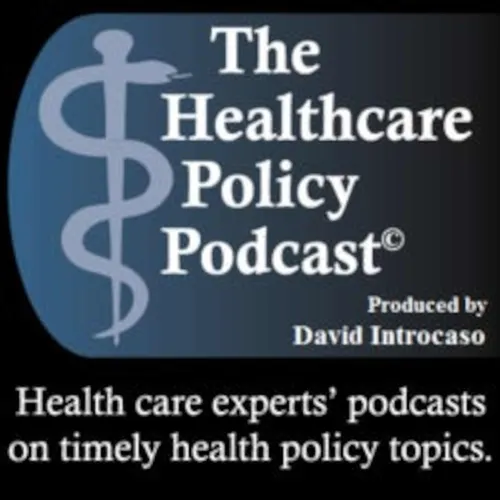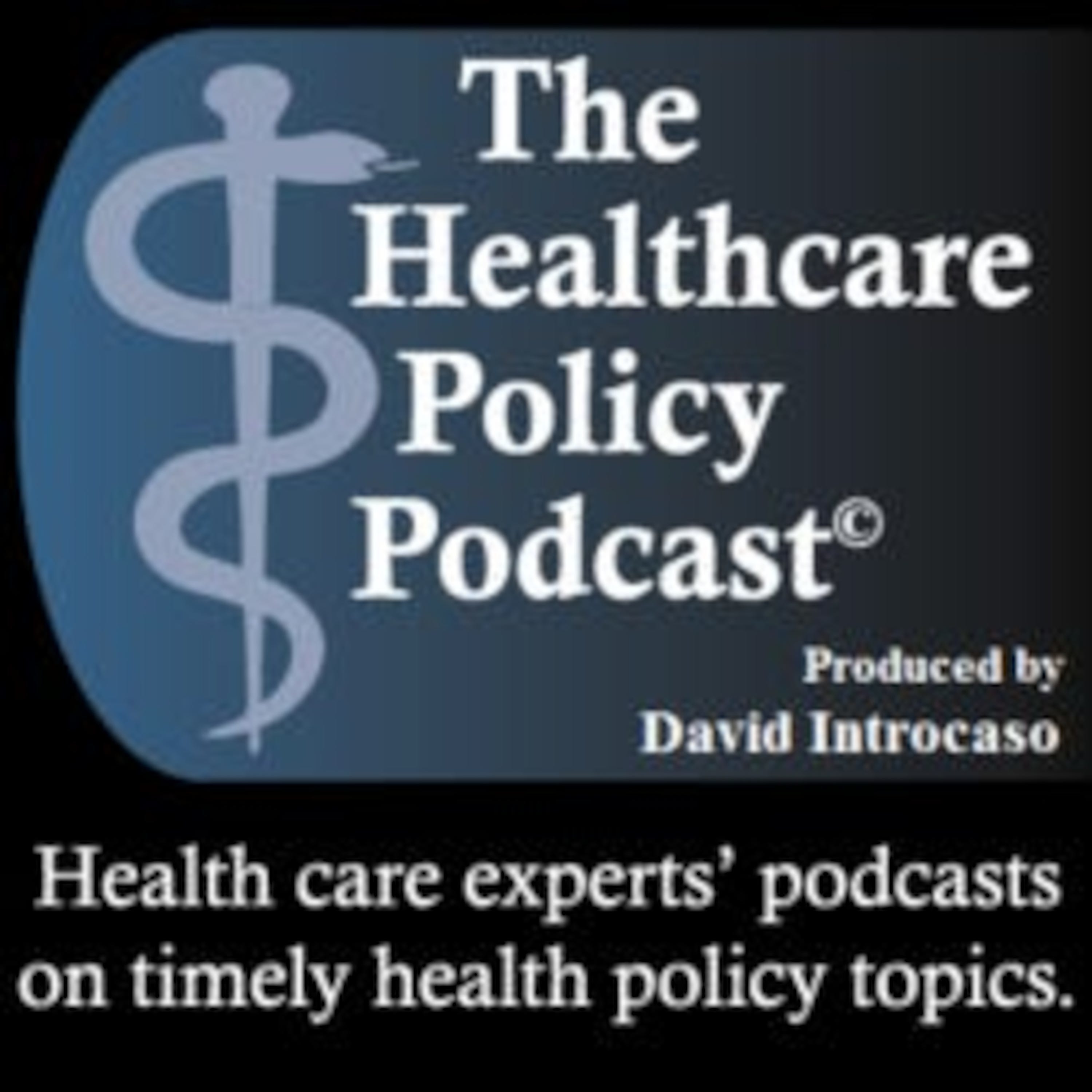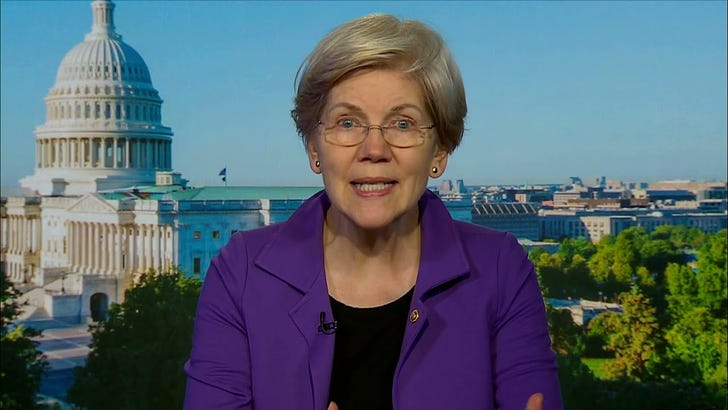
The Healthcare Policy Podcast ® Produced by David Introcaso
Health care experts' podcasts on timely health policy topics.
- Update frequency
- every 16 days
- Average duration
- 29 minutes
- Episodes
- 319
- Years Active
- 2012 - 2025

Prof. Tad Delay Discusses His Recent Work, "Future of Denial, The Ideologies of Climate Change"
Climate denial remains rife in the US. For example, in Washington, D.C., nearly 25% of the current members of Congress are, via their public statements, climate denialists. As for Health and Human …

Ms. Alyson Rosenthal Discusses Food As Medicine
In the recent past, hunger, food insecurity and malnutrition have (re)gained policymakers’ interest largely due to the COVID pandemic and accelerating climate breakdown – that has among other things …

Nathan Martinez Discusses the Government’s Attempt to Address Out of Network Healthcare Billing
In late 2020 the Congress passed the No Surprises Act largely intended to address patient “surprise,” or out of network bills, typically the result of ER visits. Should settlement between the healt…

Stephanie Wang Discusses the Health Disparities Think Tank
Over the past four decades the US has, per a 2019 JAMA-published study, made a “clear lack of progress on health equity.” Health equity or disparities have almost certainly worsened over the past fi…

Columbia's Sabin Center's Executive Director, Michael Burger, Discusses State of Play Re: Climate Crisis-Related Litigation
Mr. Burger joins me to discuss climate crisis-related litigation here and abroad and its effectiveness in curbing greenhouse gas emissions. Dedicated listeners may recall I interviewed Mr. Burger in…

Clayton Page Aldern Discusses His Recently Published, "The Weight of Nature, How a Changing Climate Changes Our Brains"
Climate-related health effects are typically defined or limited to those resulting from extreme weather events, exacerbations of chronic disease and increases in vector borne diseases. Unfortunately…

300th Podcast Interview: Merle Hoffman Discusses Her Just-Published, "CHOICES, A Post-Roe Abortion Rights Manifesto"
In Dobbs v. Jackson Women’s Health Organization, the Supreme Court in June 2022 reversed the court’s previous 1973 Roe v Wade decision, and 20 related cases, wiping out a half century of constitution…

Dr. Mitchell Li Discusses Reforming Corporate Practice of Medicine Legislation
Over the past 12 years this podcast has discussed increasing corporate dominance of healthcare delivery, made evident in part by the fact the healthcare market is highly concentrated and highly lever…

Professor John Abraham Discusses Rising Ocean Heat Content
Research published last month in Advances in Atmospheric Sciences by Prof. Abraham and his colleagues once again show ocean temperatures, more specifically ocean heat content (OHC), once again dramat…

Dr. Ajay Chaudhary Discusses "The Exhausted of the Earth, Politics in a Burning World"
In his soon-to-be-published book, Dr. Chaudhary argues the climate crisis or the Anthropocene era is the political product of rightwing climate realism - what he terms the “Rex Tillerson Position.” …

Dr. Robert Scoggins Discusses Medicare's Recent Regulatory Reform to Improve Sepsis Care
Sepsis presents an enormous public health threat. There are for approximately 1.7 million hospital cases and 270,000 deaths per year. Sepsis is consistently in the top five for hospital case volume…

David Ropeik Discusses His Just-Published Book, "Curing Cancer-Phobia, How Risk, Fear and Worry Mislead Us"
In part because there are over 10,000 known human diseases and symptoms thereof may have numerous possible explanations, frequently diagnostic tests can be in-determinative or less informative than o…

UCLA Law Professor Joanna Schwartz Discusses Her Just-Published, "Shielded: How the Police Became Untouchable"
According to the non-profit Mapping Police Violence, since 2013 when experts first starting tracking police shootings, last year was the deadliest year on record with 1,176 law enforcement gun deaths…

Columbia University's Ms. Cynthia Hanawalt Discusses Public Reporting of Greenhouse Gas Emissions
US healthcare emits a massive amount of carbon pollution at approximately 600 million tons annually or roughly 9% of total US greenhouse gasses. Because of the rapid increase in climate crisis-relat…

Dr. Robert Moffit Discusses "Modernizing Medicare: Harnessing the Power of Consumer Choice and Market Competition"
US healthcare spending is extreme currently at approximately $4.3 trillion. The single largest payer of healthcare services is Medicare at roughly $900 billion annually or 21% of total healthcare sp…

Prof. Nancy Tomes Discusses Patients as Consumers and to What Extent Defining Medicine as a Commodity Has Proven Useful
Over the past several decades healthcare has increasingly defined patients as medical consumers. For example, healthcare advertising is today a $22 billion annual business; federal policymakers have…

Professors Fredrik Albritton Jonsson and Carl Wennerlind Discuss They're Recently Published Book, "Scarcity: A History From the Origins of Capitalism to the Climate Crisis"
Professors Albritton Jonsson and Wennerlind’s recently published book, “Scarcity” by Harvard University Press, offers interpretations of a key concept in economic theory: scarcity, or the belief we l…

Dr. Richard Young Discusses His Dystopian Healthcare Novel, "2060" (August 1st)
Dr. Young’s novel, “2060” tells the story of Willis Smith, a data analyst employed by IntegraHealth Pharmaceuticals. Mr. Smith is assigned to identify a surviving meta-quad, a patient that has survi…

Sonia Roschnik Discusses the International Hospital Federation's Environmental Sustainability Programming
On background, listeners are aware that the US healthcare industry emits an enormous amount of GHG pollution, that hospitals are the largest contributor to industry emissions, that they are substant…

Professor Larry Churchill Discusses "Bioethics Reenvisioned, A Path Toward Health Justice"
Professor Larry R. Churchill, Emeritus Professor of Medical Ethics at Vanderbilt, discusses “Biotethics Reenvisioned,” a just-published book he co-authored with Wake Forest Professor Nancy M. P. King…